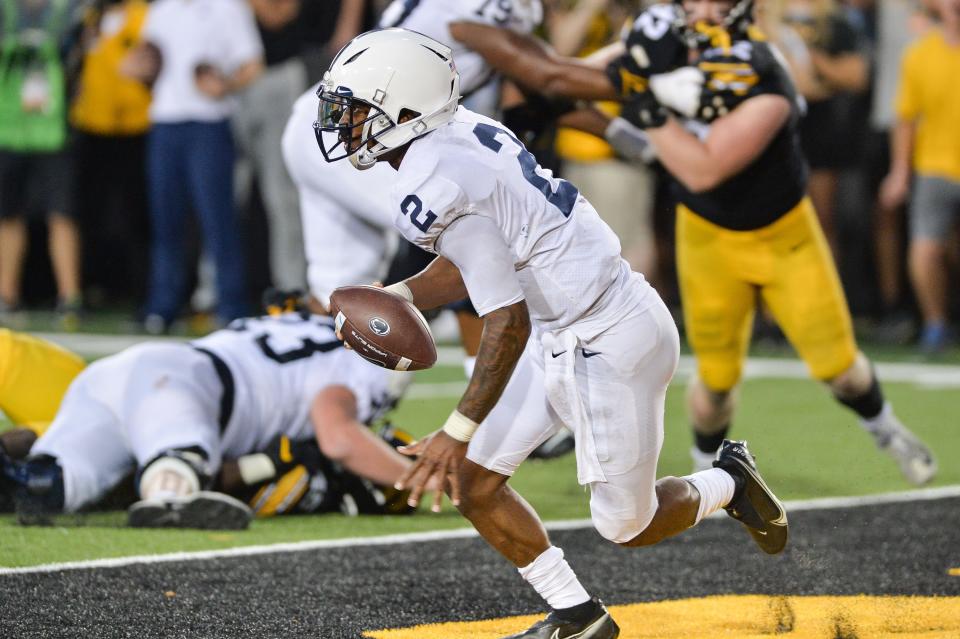It's harder than ever to keep a good backup quarterback. But as Penn State's meltdown at Iowa showed, it's just as necessary.
Nobody could have imagined that one of the most significant days of the 2021 college football season occurred Jan. 28.
That’s when Will Levis, the backup quarterback at Penn State who threw 102 passes in his first three seasons of college football, announced he would enter the transfer portal. At the time, it didn’t seem like such a big deal. Levis had been a solid backup when called upon, but he wasn’t beating out Sean Clifford for the starting job.
So Levis went to Kentucky and another Penn State backup, Micah Bowens, left for Oklahoma. But losing two quarterbacks in a year isn’t unique to the Nittany Lions. When a college football program has an entrenched quarterback these days, those behind him on the depth chart likely are going to look for more playing time somewhere else. It’s now just part of the sport.
It can also change the trajectory of everything.
Before Clifford suffered an unspecified injury in the second quarter Saturday, it certainly appeared that No. 4 Penn State was going to beat No. 3 Iowa — a result that would have had massive implications on the Big Ten and College Football Playoff race.
At the time, Penn State led 17-3 and had been able to move the ball on Iowa’s defense. Clifford, despite two interceptions, had been quite effective. As the first half wore on, the Nittany Lions looked more and more comfortable on the road in rowdy Kinnick Stadium. It was not hard to envision them winning the Big Ten or perhaps even making a strong College Football Playoff case with just one loss to Ohio State.
And then, just one awkward hit later, it was all over. It took Iowa until midway through the fourth quarter to finally take the lead, but it had to be a helpless feeling for Penn State coach James Franklin to watch inexperienced redshirt sophomore Ta’Quan Roberson try to operate his offense on the road against a nasty opponent. With Roberson in the game, Penn State just couldn’t do much of anything.
ANALYSIS: Opportunistic Iowa shows up right on time
WINNERS AND LOSERS: The highs and lows from Week 6

As a result, any Penn State hopes of making the Playoff hinge on beating Ohio State in Columbus on Oct. 30.
There’s nothing new in football about the health of a starting quarterback being the fulcrum for whether teams reach their ceiling. At some point in nearly every season, the backup quarterback is going to matter. But in the era of the transfer portal, where so many quarterbacks make themselves free agents if they’re not starting, it’s the one position that most programs can’t really bank on from one year to the next.
How valuable is an experienced backup quarterback who isn’t itching for a change of scenery? Just look at Georgia, which has had to play Stetson Bennett IV in two crucial games against Arkansas and Auburn the last two weeks because of J.T. Daniels’ lat strain.
Bennett, who actually left Georgia after his freshman year to play junior college ball but returned in 2019, has proven to be quite valuable the last two seasons. He’s not going to win any all-SEC awards, but he runs a functional offense, limits mistakes and makes the high-percentage throws. Saturday’s 34-10 win at Auburn was arguably the best game of his career with 231 passing yards on 14-of-21 attempts and 41 rushing yards.
In many ways, Bennett is the template for what every college program should aspire to for its backup quarterback: A guy who is going to stick around for multiple years, accept being a backup, understand the system and play solid football when called upon. Georgia probably needs Daniels to get healthy to win a national title, but its offense isn’t going to fall off a cliff if he’s not out there.
Penn State, by contrast, was an entirely different team when Clifford left the game. In fact, the Nittany Lions had trouble even getting snaps off without somebody moving early on the offensive line. And when they did get plays started cleanly, they couldn’t do much to help Roberson, who completed just 7-of-21 passes for 34 yards and two interceptions.
There’s no one to blame for how overwhelmed Roberson was against Iowa. Few redshirt freshmen playing in that kind of environment against arguably the second-best defensive team in the country would do well.
But if it were Levis stepping in for Clifford on Saturday instead of a totally inexperienced quarterback, you have to think Penn State would have stood a good chance of holding on.
At the same time, things have worked out pretty well for Levis, who is starting for a red-hot Kentucky team that could soon enter the top 10. His story, in a way, is a great advertisement for the NCAA’s new rule that allows players to transfer one time without penalty.
In college football, there’s only a handful of years available to maximize your opportunity. And for quarterbacks, only one can play at a time. It’s hard to tell someone like Levis that he should stick around Penn State just in case the starter gets hurt when he had an opportunity to be the guy at an SEC program.
On Saturday, though, it put Penn State in a dire position to not have an experienced backup quarterback against an opponent like Iowa. And it may have just sunk the Nittany Lions’ hopes of putting together a dream season.
Follow USA TODAY Sports columnist Dan Wolken on Twitter @DanWolken
This article originally appeared on USA TODAY: College football: Why it's harder than ever to keep a good backup QB

